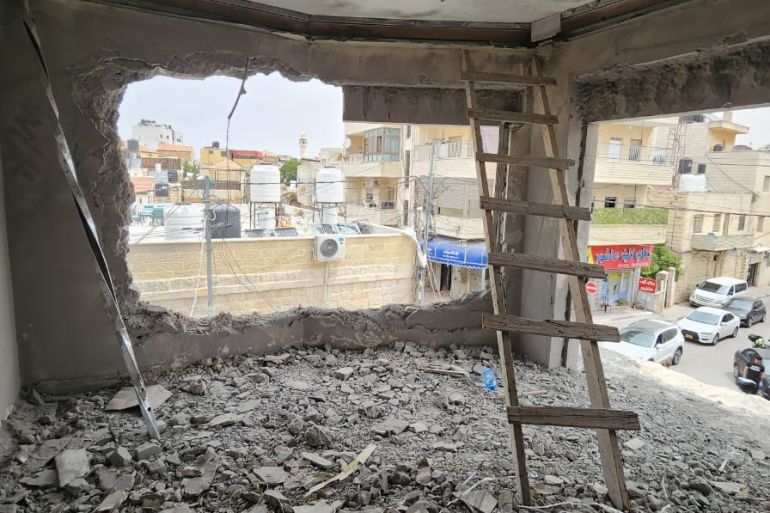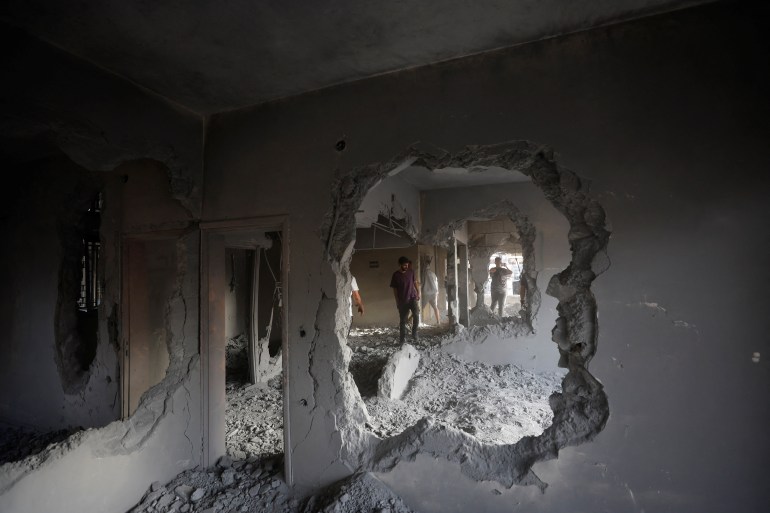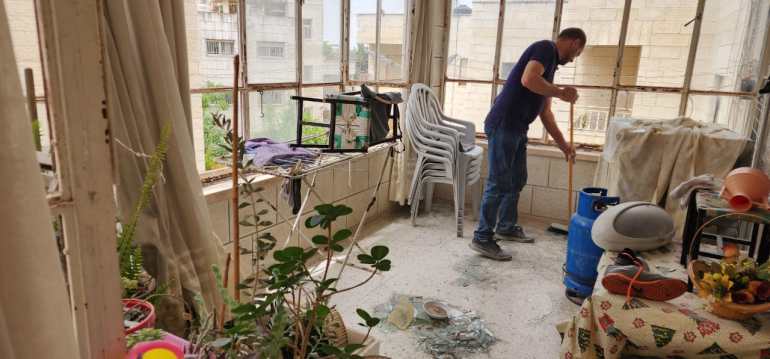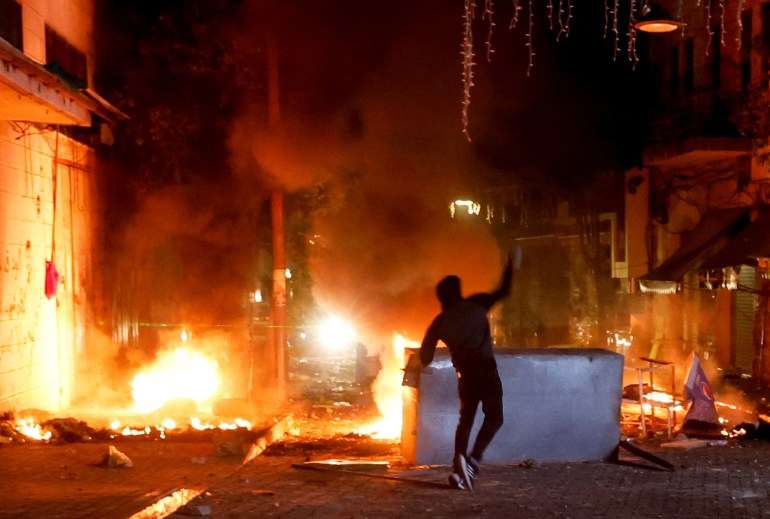‘Collective punishment’: Israel demolishes Palestinian homes
Israel’s policy of demolishing the family homes of Palestinians accused of attacking Israelis is considered a war crime.

Ramallah – At dawn on Thursday, Israeli forces stormed Ramallah city in the occupied West Bank and blew up the family home of a Palestinian prisoner.
The large contingent of Israeli soldiers poured into Ramallah al-Tahta (lower Ramallah) in the Old City area, cordoning off the family home of 27-year-old Islam Faroukh.
Keep reading
list of 3 itemsIsraeli forces kill Palestinian ‘after scuffle’ near Ramallah
Three shot as Israeli forces raid Ramallah in occupied West Bank
According to residents, the Israelis spent hours planting explosives that later pulverised the Faroukh family’s apartment.
Video footage of the operation showed soldiers painstakingly planting explosives in the walls of the home before the massive blast that turned the spacious apartment to ruins and rubble, while also blowing out the windows of homes in the neighbourhood.
“My son is still under arrest and has not been tried yet,” Islam’s mother Abeer Faroukh told Al Jazeera.
“How is the house blown up in such a way that affected the whole neighbourhood, before a fair trial for my son?” she asked.
With her son innocent until proven guilty in court, Abeer Faroukh says the “real crime” was the destruction of the family’s home and the damage done to the neighbourhood.
Demolishing the homes of Palestinians “suspected of carrying out attacks” on Israelis is a long-held practice of Israel. Thousands of Palestinian people have lost their homes to demolitions in what human rights groups say is a policy by Israel of “collective punishment” that may amount to war crimes.
“International humanitarian law, including the Hague Regulations of 1907 and the Fourth Geneva Convention, prohibits collective punishment, including deliberately harming the relatives of those accused of committing crimes, in all circumstances,” Human Rights Watch said in February.
“Courts around the world have treated collective punishment as a war crime,” the rights group said.
Arrested in December, Islam Faroukh was accused of carrying out bomb attacks at bus stops in Jerusalem that killed two people, including an Israeli-Canadian teenager, and wounded 14 others. He has denied the allegations.
“We are sure that he is innocent,” said Harbi Faroukh, Islam’s father, adding that his son may face a life sentence in jail because of “unjust accusations”.
The family tried to appeal the demolition order to Israel’s High Court of Justice, seeking to have their homes sealed rather than destroyed, but to no avail.
“The house is not ours. It belongs to Islam’s grandfather, and we tried to clarify this matter with the Israeli authorities,” the father said.

“What is our fault for our house to be demolished in this way?” he asked.
“The accusations against our son have not yet been proven. On what basis are we displaced and punished in this way?”
Harbi Faroukh and his wife and four daughters are now homeless, he told Al Jazeera, and the family has had to move in with his brother.
“The Israeli occupation insists to practise a policy of collective punishment against us,” Harbi Faroukh added.
“It is a losing policy that does not enrich or fatten from hunger.”
‘Collective punishment is a policy of terror’
All residents in the four-storey building where the Faroukh family had their apartment were ordered out when the Israeli soldiers arrived at about 10pm (20:00 GMT) to start setting their explosives.
Residents were prevented from returning to check on their homes until after the soldiers withdrew at about 7am (05:00 GMT) on Thursday and detonated the explosion that turned the Faroukh home into little more than holes in brick and concrete walls.
Witnesses told Al Jazeera that the force of the blast damaged many houses in the neighbourhood.

Ibrahim Musa, a father of four who lives next to the Faroukh family’s apartment building, told Al Jazeera how Israeli soldiers broke into his house with a dog, which terrified his children, and told him to evacuate.
“Israel says that the prisoner held is a terrorist, but what about what [this] is doing against us?” Musa said, adding that demolishing Palestinian homes in such a manner was itself like “terrorism”.
Musa’s house was severely damaged by the blast. Some of his walls collapsed and the windows in his house shattered.
“The policy of collective punishment is a policy of terror against all Palestinian people and an attempt to intimidate every Palestinian citizen,” he added.
During the demolition operation, intense confrontations broke out between Palestinian residents and Israeli forces in several parts of Ramallah city. Young men threw stones and Molotov cocktails at the Israeli patrols who responded with bullets, tear gas and stun grenades.
Six Palestinians were injured in the clashes and brought to the Palestinian Medical Complex. One was treated for a bullet wound in the flank, and two others were treated for bullet wounds in the thigh and foot. Another was hit by a rubber-coated metal bullet in the hand, and two were treated for inhalation of toxic tear gas, according to the Palestinian Ministry of Health.

Israeli soldiers also targeted journalists who were present and covering the Ramallah raid. Palestinian photojournalist Moamen Samreen was shot in the head by a rubber-tipped bullet and was taken to hospital, and Rabih al-Munir, also a photojournalist, was hit in the abdomen by a rubber-coated metal bullet.
Moamen’s uncle, Mohammad Samreen, also works as a photojournalist for several news agencies and witnessed the moment when his nephew was shot by Israeli forces.
“We were about 20 journalists … stationed in a safe place by ourselves. While we were there, Israeli forces fired gas bombs and bullets at us more than once,” Samreen said.
“We hid on the ground, Moamen, my nephew, stood and moved from his place to another. Suddenly he was shot immediately by the Israeli soldiers,” he said.
Hit by a rubber-coated bullet behind the ear, his nephew suffered a skull fracture and brain haemorrhage.
“The Israeli occupation deliberately targets journalists directly. It was clear to everyone that we were journalists and Moamen was wearing his press vest, yet he was targeted,” his uncle said.
In recent months, Israeli forces have repeatedly targeted Palestinian journalists working in the field, whether with tear gas or live bullets, he added.
Visiting what was left of the Faroukh family home following the Israeli demolition operation, Palestinian Prime Minister Mohammad Shtayyeh said Israeli forces were engaged in a “full-scale reinvasion of the West Bank through its daily raids into Palestinian towns and cities”.
Describing a policy of “collective displacement” being carried out against Palestinians through such collective punishments and home demolitions, Shtayyeh added that Israeli forces were being shielded by “the immobility and double standards of the international community”.